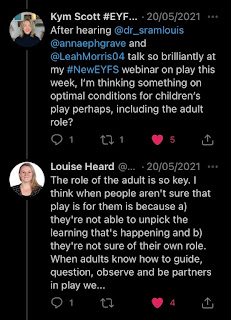The Role of the Adult in Play
What is the role of the adult in play?
This is something that really intrigues me and an inquiry that will evolve and deepen once I teach Kindergarten in September. Reflecting on what I have been reading and viewing is allowing me to pull out big ideas that resonate with me right now and will act as "success criteria" for my role next year.
I was really struck by a few tweets in a thread I started:
It is often useful to consider what something is not to clarify and deepen an understanding of what something is. The idea of director resonates with and contradicts the notion of play based on choice and intrinsic motivation. Control is an important variable in learning and teaching. Who has the control? In a recent webinar, Lisa Murphy promoted the idea of us as adults controlling the environment and not the child. I think there are opportunities for children to make decisions and take ownership of their learning spaces, too.
The idea of a distractor connects so well to what I have heard Dr Peter Gray speak about. Our role is not to interrupt children from their state of play, or deny them opportunities to inquire, to negotiate and to think for themselves. These examples of self-regulation are harmonious with the Approaches to Learning in the PYP. Dr Gray is an advocate of freedom for and trust in children which has huge implications for our role. I plan to think carefully about my interactions with children and the types of questions I am intentional in asking. Questions that might open up more possibilities and reveal a child's thinking and theories, rather than questioning for the sake of questioning, and disrupting rather than enhancing play.
I love thinking about the idea of us being or feeling like a lost part! The role of the adult in play is an active one, yet someone observing the adult might not see how active the role is. Perhaps the adult is observing, listening with intent and reflecting on what decision to take next, which may well be to continue to observe. The role is not passive.
The role of the teacher is outlined in The Learner document as part of IB's From Principles into Practice.
In the PYP early years, teachers take on many roles and identities, including:
- facilitator
- researcher
- participant
- provocateur
- navigator
- observer
- documenter
- reflective practitioner.
Specifically within observation, I want to target listening TO children. I am also thinking a lot about the learning space for next year and how I might be able to set this up with the children to maximise play and creativity.
Just yesterday, Simon Greg wrote this blog post that explored the role of the adult. I was particularly struck by the line: Maybe that word catalyst helps to unravel that apparent paradox: the teacher not as the agent, but as the enabler, allowing the natural powers of the students lead the way to new possibilities.
I have been re-reading this inspirational book. One of the roles of adults that Reggio advocates is that of a facilitator. Not to simplify learning, but to actively explore complexity, stimulate interest and engage thinking.
The text gives us powerful examples of teacher behaviour:
- A teacher turns a dispute into a shared investigation
- A teacher observes a child's purposeful play, and curiosity (of both) is aroused
- Teachers follow the children's interests
- A teacher provides instruction in tool use and technique
- A teacher scaffolds conceptual understanding
- A teacher relaunches a project.
In an attempt to define a teacher's role, the text pushes us to consider specific contexts, beyond abstract terms. It offers this wonderful insight: What kind of teachers are needed by our children - those real individuals in the classrooms of today?
Which roles are you most comfortable with?
Which roles are more of a challenge for you? Why?






I like the PYP EY descriptor of teacher as provocateur. I like to think that means being a quiet and gentle disruptor of thinking, a stager of interesting and engaging provocations, and a supporter of interests and questions. The challenge for me always came down to the confines of time and curriculum demands I felt. And once I remembered that I held that tension - and the children did not - I was more confident in relaxing into the playful inquiry that was always there in the first place.
ReplyDelete